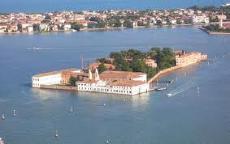S. Servolo Hospital

At the end of the 600 the wars forced the Senate of Venice to provide
assistance to the afflicted “poor soldiers” and the choice of a location for
the foundation of a military hospital fell on the Island of S. Servolo, on
which the “Milizia Hospital” was established.
In 1715 the Priests from “S. Giovanni di Dio” and then “FateBeneFratelli” were called to give assistance.
It was here, in
1725 a man called Messer Stefani was hospitalized in the military
hospital as “insane” but only with the arrival
and spirit of the French Revolution the City of Venice ordered the admission of
the mentally insane at S. Servolo at the expenses of the revenue.
The collaboration between the two hospitals, “Milizia” and Asylum of the insane, lasted until 1809, when
S.Servolo then became the Venetian Central Insane Asylum for mixed sexes.
After 1815 the commitment
for the mentality ill developed and the theory of curing and healing was taken
into consideration. Due to the over crowded structure, it was necessary to
transfer some female insane patients to the Civil Hospital. The extreme social
poverty at that time was such that Prosdocimo Salerio, doctor and director of S.Servolo from 1847
to 1877, wrote that he was unable to dismiss the patients due to the poor
conditions of their families.
With the
twentieth century the criticism spread regarding the role of only assistance
and custody. The protests arose for what in the nineteenth century was called
“moral cures” but in reality often revealed to be cruelty and systems of enforcement
on the patients, while there were more
possibilities due to pharmacological cures.
In 1902 the management
of the S.Servolo and S.Clemente Hospitals were taken over by the Province of
Venice. While in the forties remarkable progress was made on mental illness due
to the major diffusion of psychotherapy methods, applied also at S. Servolo
thanks to the initiative of G. Sacerdoti.
In 1967 Franco
Basaglia entitled his book “What is psychiatry” and while interrogating himself,
what is the science that up to now had given only negative solutions in the
relationship with patients who remained excluded, not subject to cure but
detention, started his battle to knock down the walls that surround mental
asylums. This battle lead to the proclamation of the famous law 180 in 1978
which proclaimed the closure of the psychiatric hospitals.
In the Islands
of the Lagoon we have seen convents transformed into medical structures in
absentia which slowly degrade and disappear. Only the island of S. Servolo for
long centuries convent of mediation and thought, then transformed in island of
pain, as a military hospital and then asylum for the
insane, has now returned to be an island of culture and mediation, and archive
of its medical history.


